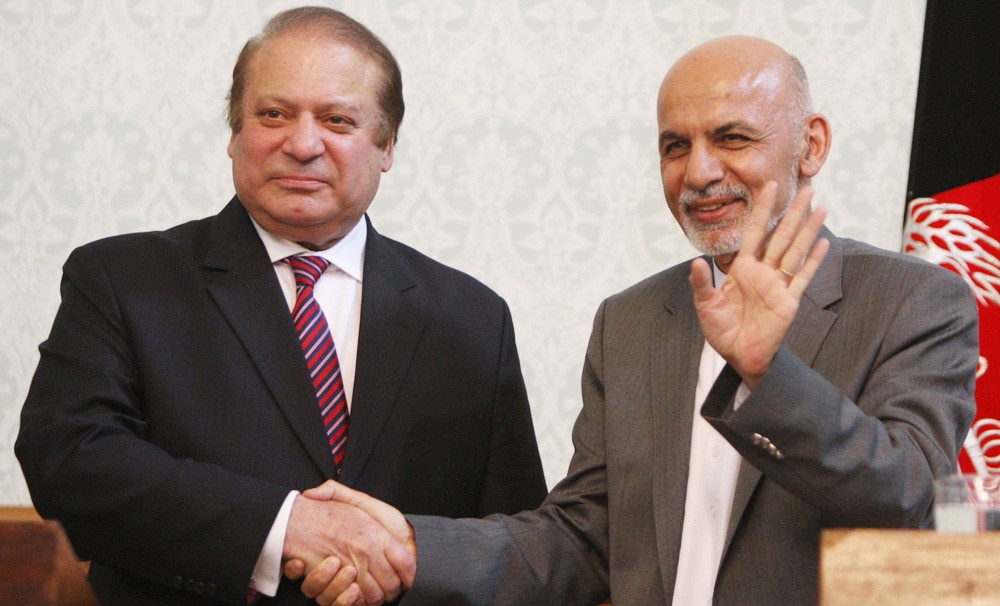
During his Kabul visit, Premier Nawaz Sharif pledged action against any militant group trying to destabilise Afghanistan

Is the Pakistan government heading for a confrontation with the Afghan Taliban movement? Indeed, this is the impression one is getting from the unusually tough anti-Taliban and pro-Kabul statements recently given by Prime Minister Nawaz Sharif and Chief of Army Staff General Raheel Sharif.
The statements and warning to the Mullah Mohammad Omar-led Afghan Taliban is yet to have any impact. The Taliban attacks in Afghanistan in recent days have registered an increase and could rise further as the weather becomes warmer. A suicide attack on a guesthouse in Kabul on May 13 was particularly brutal as 14 persons, including one British with dual Afghan nationality, four Indians, two Pakistanis, and one citizen each from the US, Italy and Kazakhstan, enjoying a concert were killed and many more were wounded.
During his one-day visit to Afghanistan on May 12, Prime Minister Nawaz Sharif declared the ongoing Afghan Taliban’s "Azm" spring offensive as an act of terrorism and expressed solidarity with President Dr Ashraf Ghani’s unity government in tackling its enemies.
Accompanied by COAS General Raheel Sharif, Inter-Services Intelligence (ISI) director general Lt. Gen Rizwan Akhtar and some of his ministers and advisers, the prime minister condemned the increase in violence as a result of the Taliban’s so-called spring offensive. He stressed that an effort by any militant or group to destabilise Afghanistan would be dealt with severely and such elements would be outlawed and hunted down.
It was Nawaz Sharif’s first visit to Afghanistan since the installation of Dr Ashraf Ghani as the president and his presidential election rival Dr Abdullah as chief executive officer on September 29, 2014. The Prime Minister had paid a visit to Kabul earlier in 2014 when Hamid Karzai was the president and relations between the two neighbouring countries were clearly hostile.
President Ghani visited Pakistan late last year to herald a noticeable improvement in Pak-Afghan relations. There have been frequent exchange of visits and public displays of goodwill and friendship. The two sides have stopped making allegations against each other, shelling and rocketing across their long and porous border has stopped, border coordination and management is improving and disputes hampering the Afghan transit trade through Pakistan have largely been resolved.
During his Kabul visit, Premier Nawaz Sharif also declared that enemies of Afghanistan cannot be friends of Pakistan. He made it clear that peace in the region wasn’t possible without crushing terrorism and pledged action against any Taliban sanctuaries found in Pakistan.
Army chief General Raheel Sharif reiterated his earlier statement that enemies of Afghanistan are also Pakistan’s enemies.
Such statements must have been music to President Ashraf Ghani’s ears and unbelievable for many Afghans, including Dr Abdullah and former president Hamid Karzai, who have always doubted Pakistan’s sincerity in tackling the militants committed to fighting and overthrowing the Afghan government. Apparently, keen to highlight his anxiety whether the Pakistan leaders would translate their words into action, the Afghan President argued that the criterion for friendship is that a friend stands beside a friend in very tough situations.
The Afghan unity government needed such an assurance from both the civil and military leadership of Pakistan because it was becoming disappointed that Islamabad had failed to bring the Afghan Taliban to the negotiations table as reportedly promised by it. In fact, Kabul had hoped that the peace talks with the Taliban would begin in the first week of March. As it didn’t happen due to the Taliban reluctance to change their policy not to recognise the Afghan government, the anti-Pakistan forces in Afghanistan had started criticising President Ashraf Ghani for reposing too much trust in Pakistan. During a recent visit to Kabul, one heard the President’s close aides that Ashraf Ghani had invested all his political capital in befriending Pakistan and the latter’s inability to persuade the Taliban to hold peace talks with the Afghan government would weaken him considerably.
Though the recent conference organised by the non-governmental organisation, Pugwash, in Qatar provided Afghans of different political persuasion including the Taliban to interact and listen to each other’s views regarding the peace process and Afghanistan’s future, no direct talks were held between the Taliban and the pro-Afghan government delegates present at the event in their individual capacity. The real peace talks would be held when Taliban give up their opposition to the idea and accept the Afghan government as a reality. Too many hopes are being attached to Pakistan to make this happen. However, its efforts to convince the Afghan Taliban to enter into peace talks with Kabul have made no real headway. The Taliban continue to demand the immediate and complete withdrawal of US-led foreign forces before agreeing to talk peace with the Afghan government. Fearing division in their ranks, Taliban have stuck to an inflexible position in the hope that the Afghan security forces would disintegrate in the face of their stepped-up attacks and enable them to make battleground gains.
Pakistan government’s tough new stand against militants, including the Afghan Taliban, could put the two sides in rival camps and bring the governments in Islamabad and Kabul closer. In such a scenario, the Afghan Taliban and its Haqqani affiliate could join hands with the Pakistani Taliban and other militants to destabilise Pakistan. To tackle any such challenge, the Afghan and Pakistan governments would first have to fulfil their promise to deny the use of their space to militants who want to destabilise both countries.